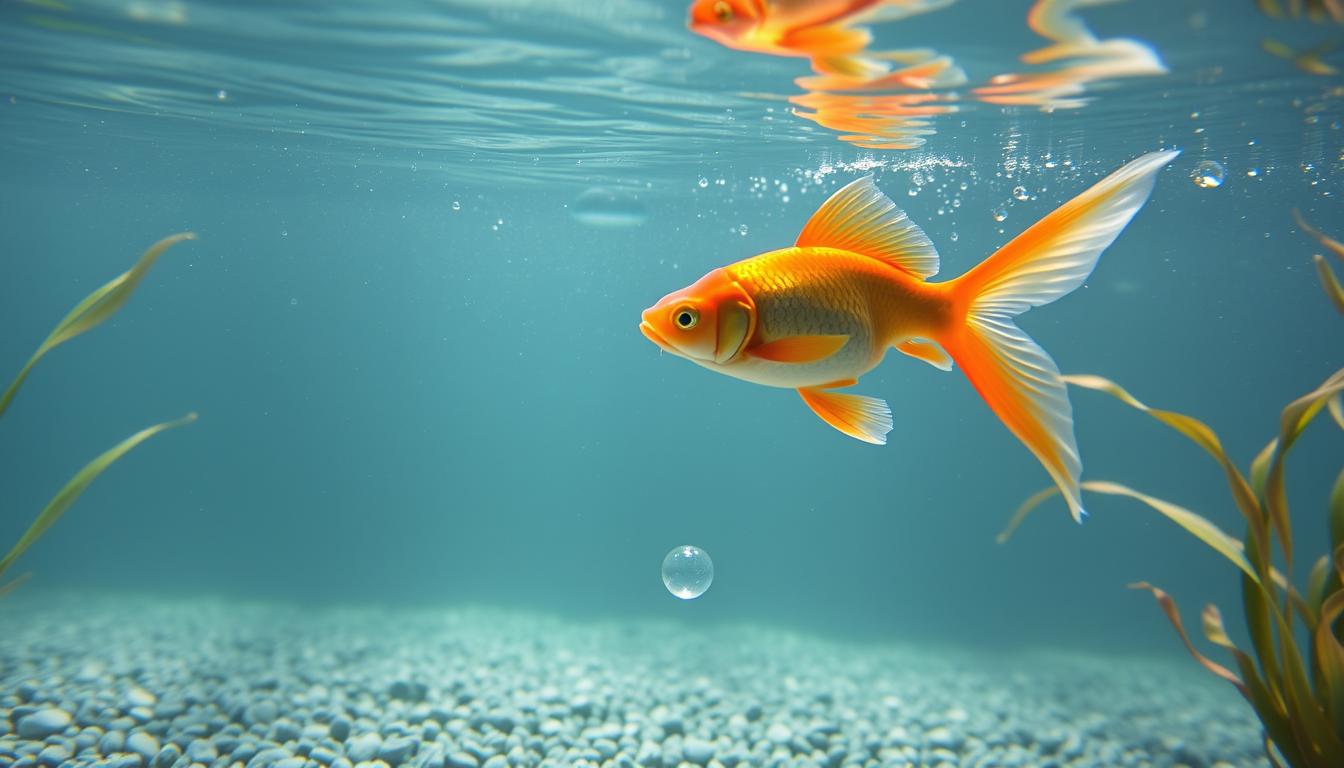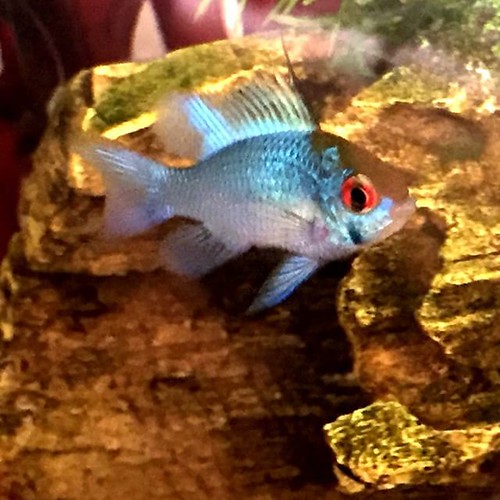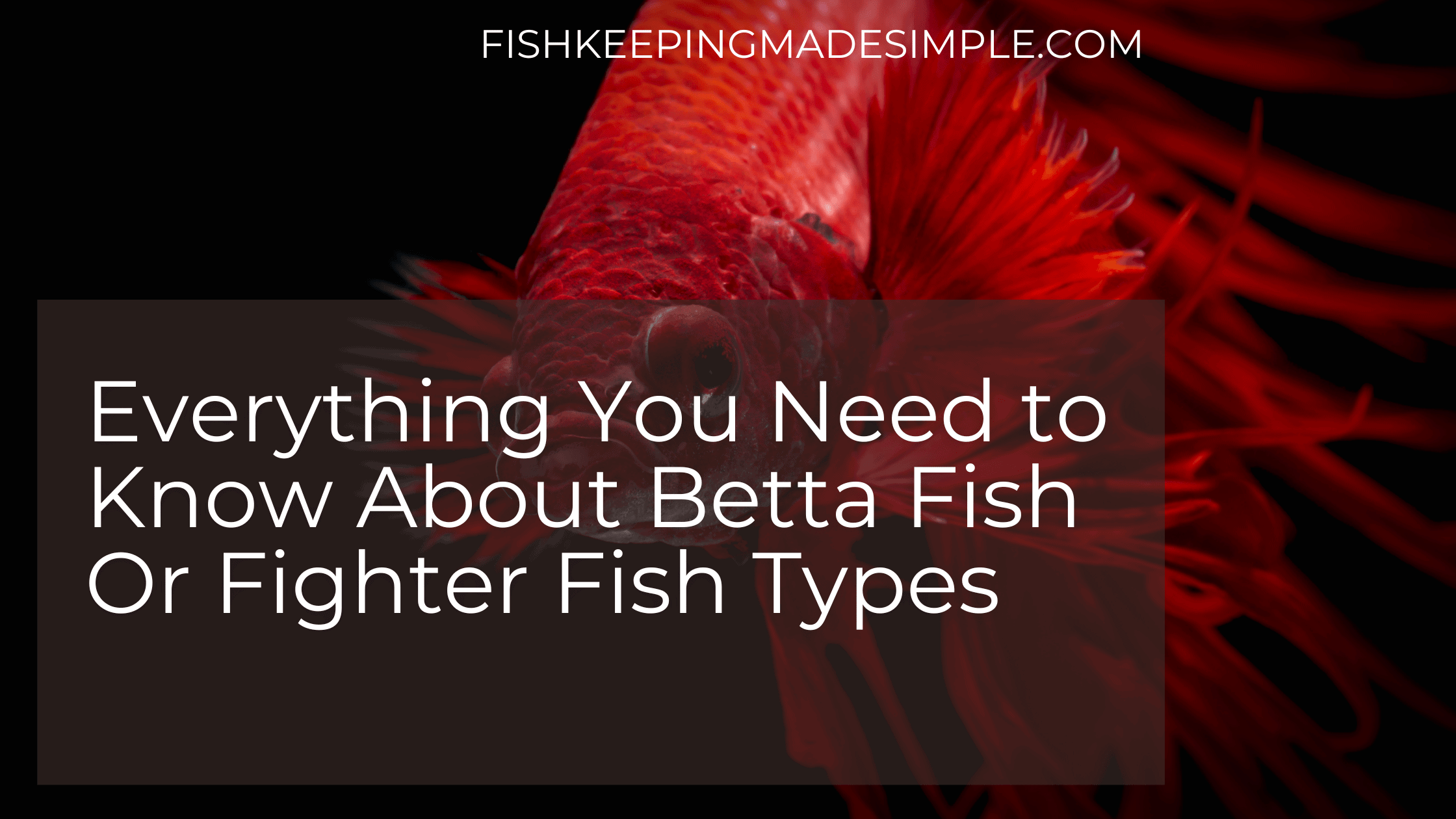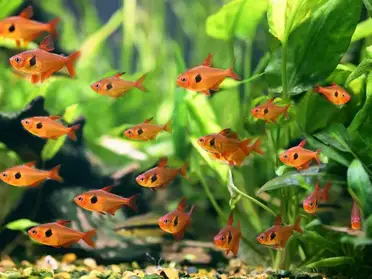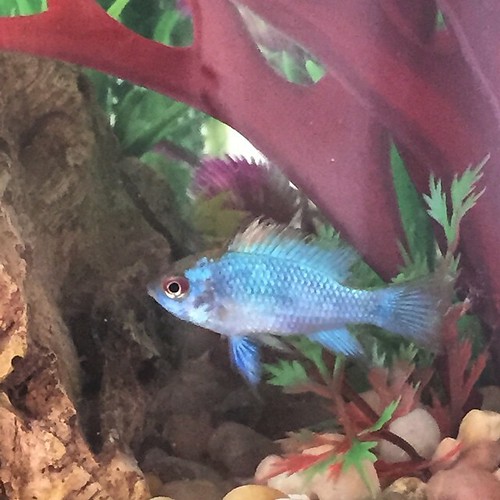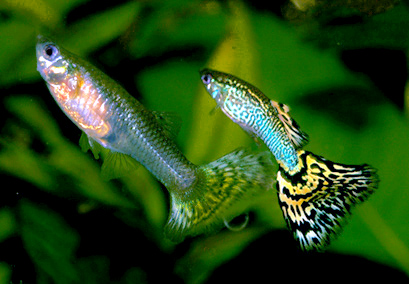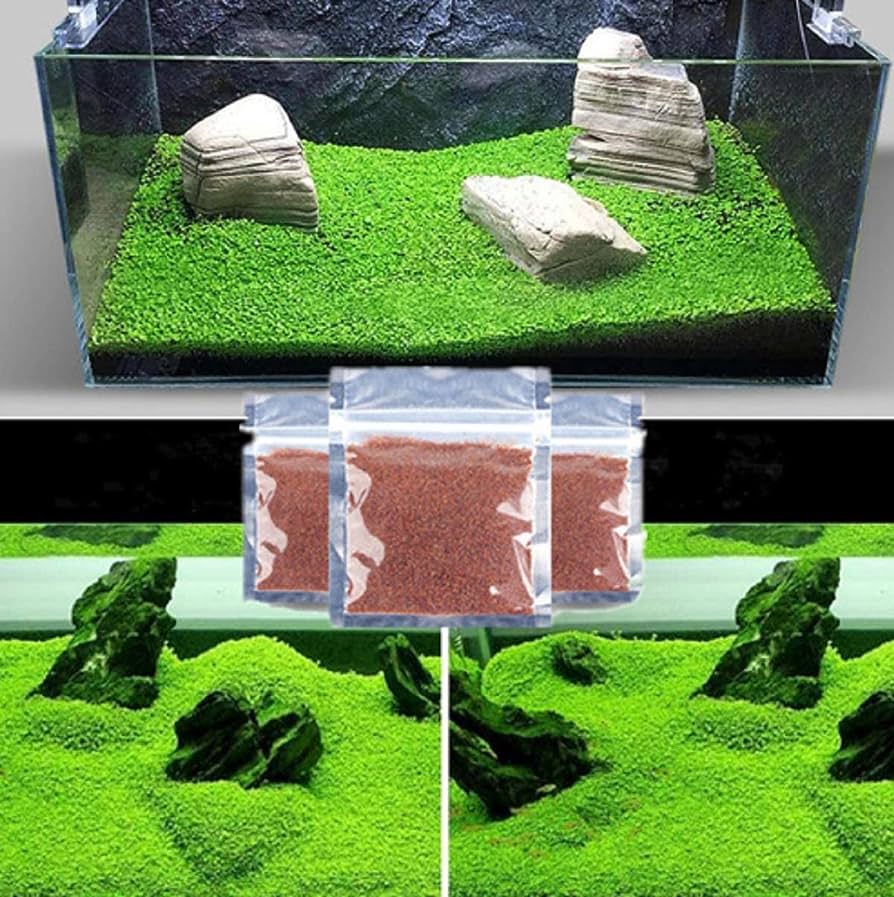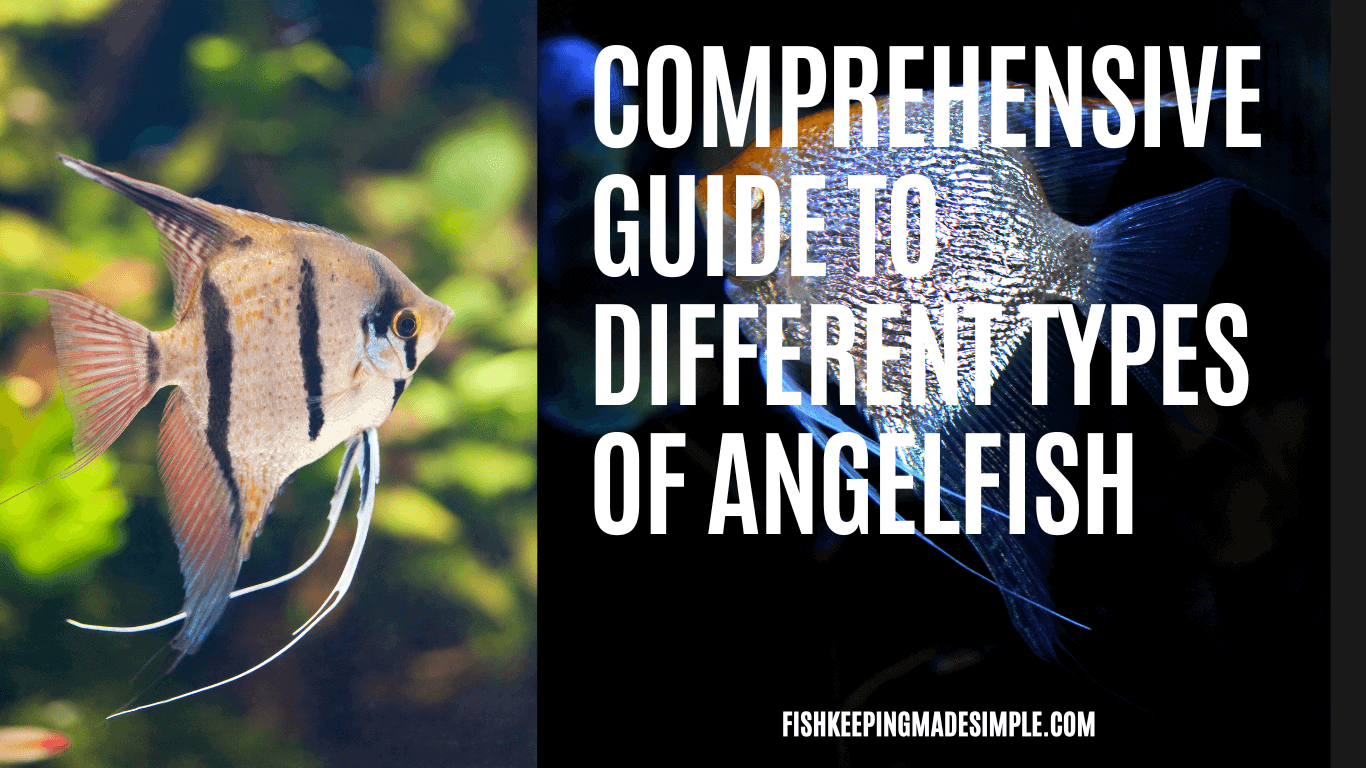Why does cold water slow metabolism in goldfish?: Did you know skinny-bodied goldfish can survive in freezing water? They can handle temperatures as low as 32°F (0°C). This fact leads to questions about how cold impacts their metabolism. Goldfish, being ectothermic, depend on their environment to regulate their body temperature. This affects their metabolic rate. When it gets colder, their metabolism slows. This article explores how cold water impacts these fish and the importance of keeping their water warm.
Table of Contents
Key Takeaways
- Cold water temperatures significantly impact the metabolic rates of goldfish.
- Goldfish are ectothermic, relying on external temperatures to regulate their metabolic functions.
- The ideal temperature range for skinny-bodied goldfish is 65°F-78°F (18.3°C-25.5°C).
- Warmer temperatures promote faster digestion and growth in goldfish.
- Environmental temperature influences both behavioral changes and long-term health implications for goldfish.
Understanding Goldfish Physiology
Goldfish physiology is fascinating because they are ectothermic. This means they cannot adjust their body temperature on their own. They depend on the water around them to stay at the right temperature. This impacts their metabolism and behavior deeply. Knowing this helps in taking good care of goldfish, making sure they stay healthy and active.
The Ectothermic Nature of Goldfish
Goldfish are ectothermic, which means their body functions change with the water temperature. For example, a 10°C increase can triple their metabolic rate. When it gets warmer, their body works faster, which makes them more active. But in cold water, they slow down and might even rest at the bottom of their tank.
Impact of Metabolic Rate on Goldfish Behavior
Temperature affects how my goldfish act. In water warmer than 75°F, they move more and eat more because their metabolism is up. But in cold water, they might enter a dormant state known as torpor, slowing down big time. So, temperature changes not just how active they are, but can also make them more likely to get sick due to stress weakening their immune system.
| Temperature (°C) | Metabolic Rate | Behavioral Response |
|---|---|---|
| 10 | Low | Reduced Activity |
| 20 | Standard | Normal Feeding |
| 25 | High | Increased Activity |
| 28 | Very High | Stress Signs |
Understanding how a goldfish’s body works, their need for the right water temperature, and how it affects their metabolism and behavior is key. It helps me make sure my goldfish has everything it needs to do well.
The Role of Water Temperature in Metabolism
Water temperature greatly influences how goldfish metabolize. Knowing the effects of temperature changes helps us care for these fish. As the water warms, a goldfish’s body works faster, affecting their growth and health.
How Temperature Affects Biochemical Reactions
Goldfish metabolism speeds up with warmer water. The rate of their body’s biochemical reactions is linked to this. Goldfish do best in water that’s between 65°F and 78°F (18.3°C – 25.5°C). Here, they grow well and stay healthy. But, if the water drops below 32°F (0°C), their metabolism slows, making them less active.
Q10 Temperature Coefficient Explained
The Q10 temperature coefficient is key for understanding goldfish metabolism. It measures how much metabolic rates go up with a 10°C temperature increase. Knowing the Q10 shows why warm water around 75°F – 78°F (23.9°C – 25.5°C) helps goldfish grow fast. But, we must watch the temperature, as too much heat can stress them out and shorten their lives.
Keeping the right temperature balance is important for goldfish health. Temperature affects their metabolism and oxygen use, which influences their well-being.
Why Does Cold Water Slow Metabolism in Goldfish?
Goldfish metabolism is significantly affected by cold water, which offers insights into their health and behavior. These fish depend on the environmental temperature around them to control their metabolism. How active they are, their hunger, and their well-being all link to this relationship.
Effects of Environmental Temperature on Metabolic Rate
Goldfish metabolic rates drop in cold water. They do best in water that’s between 65°F and 75°F (18°C to 24°C). When the temperature falls below 65°F, their metabolism slows down. This slowdown makes them less energetic and more sluggish.
Goldfish might not want to eat as much, leading to weight loss and malnutrition. The graph below shows how different water temperatures affect goldfish behavior and metabolism:
| Temperature (°F) | Metabolic Rate | Behavioral Effects |
|---|---|---|
| Below 60 | Severely Reduced | Hypothermia Risk |
| 64 – 72 | Optimal | Active Feeding |
| 73 – 75 | Increased | Potential Stress |
| Above 75 | High | Lethargy & Loss of Appetite |
Very cold water can even be deadly, causing hypothermia. It also lowers the oxygen in the water, which goldfish need for their metabolism. In warm water, they need more oxygen, which can stress them if there’s not enough. Keeping an eye on the temperature every day, especially when it changes with the seasons, is important to avoid upsetting their metabolism.
Goldfish Temperature Requirements
Keeping goldfish healthy and long-lived depends a lot on their environment. It’s important to know the right temperature needs for them. Since different types of goldfish require different conditions, setting the correct temperature is key.
Optimal Temperature Range for Goldfish
Skinny-bodied goldfish do well in temperatures between 65°F and 78°F (18.3°C to 25.5°C). On the other hand, fancy goldfish like their water a bit warmer, from 72°F to 78°F (22.2°C to 25.5°C). Keeping the water temperature stable is crucial as changes can stress them and make them less active.
Adjusting Temperature for Different Goldfish Breeds
When setting the water temperature for different goldfish, it’s important to meet their unique needs. Fancy goldfish shouldn’t be in too hot water all year, or they might not live as long. Skinny-bodied goldfish are stronger against the cold and do well in the recommended range. However, if the water gets warmer than 24°C, it can make them age faster. So, it’s vital to keep the water temperature right, especially as seasons change.
| Goldfish Breed | Ideal Temperature Range (°F) | Health Considerations |
|---|---|---|
| Skinny-bodied | 65°F – 78°F | Can thrive in cold; best growth in optimal range |
| Fancy | 72°F – 78°F | Higher temperatures lead to stress and reduced lifespan |
Cold Water Effects on Goldfish
It’s key to know how cold water affects goldfish for their well-being. In cold months, they show changes in behavior and health. These signs guide us in keeping a healthy setting for them.
Behavioral Changes in Cold Water
Goldfish act differently in cold water. Their activity drops, and they become sluggish. This results in a boring tank.
They also eat less in the cold, sometimes not at all if it’s below 54°F. This change can worry those who expect regular eating habits.
Physical Health Implications of Cold Temperatures
Cold water can be tough on a goldfish’s health, especially the fancier types. It makes them prone to getting sick. The cold slows their digestion and messes with their metabolism, causing big health problems.
While slim goldfish handle the cold a bit better, it’s still a risk. It’s important to watch their conditions closely. We must do this to keep them healthy and happy.
Goldfish Digestion in Cold Water
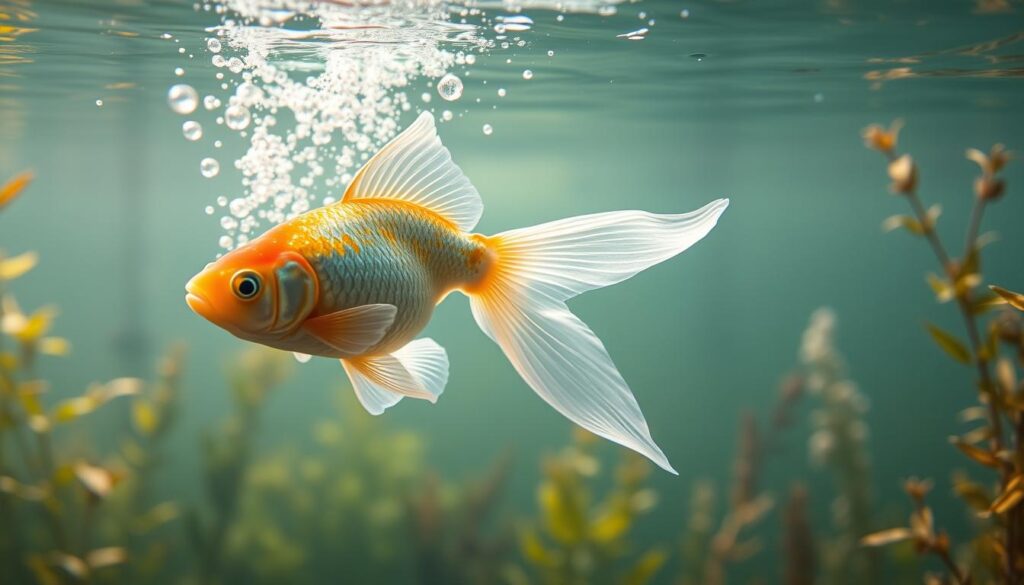
Goldfish have a tough time digesting food in cold water. Their metabolism drops as it gets colder, affecting their food intake. Knowing this helps me pick the right food for my goldfish during the cold months.
Impact on Food Intake and Nutrient Absorption
Below 70°F, I go for wheat germ-based food with less protein. At 60°F, I only feed them wheat germ to ease their digestion. This diet keeps them healthy all winter, as long as it’s over 50°F.
When it hits 55°F, they eat less because their metabolism slows. I stop feeding them under 50°F to avoid digestion issues. It’s critical to stop feeding at 40°F to keep them safe until spring.
Transitioning to Cold Water Food
Switching to cold water food needs careful planning. I use Hikari Wheat-Germ for its easy digestion during the cold. Testing the water often is a must, especially since the filter bacteria struggle below 60°F.
If the temperature suddenly drops, I feed them less, only up to twice daily. With lower energy levels in cold weather, it’s key to adjust their diet. In the coldest months, they might not need food. Come spring, I slowly increase their diet to kick-start their digestion for warmer weather.
| Water Temperature (°F) | Feeding Recommendation | Nutritional Focus |
|---|---|---|
| 70 | Wheat germ base | Lower protein |
| 60 | Exclusively wheat germ | Easy to digest |
| 55 | Reduce feeding | Monitor intake |
| 50 | Stop feeding | Prevent digestion issues |
| 40 | Cessation of feeding | Avoid health risks |
Goldfish Metabolic Rate in Different Conditions
It’s important to know how different water temperatures affect goldfish health. A study shows big differences in their metabolism in cold vs. warm water. Their metabolism changes with the water temperature; it slows in cold water. This makes them digest food slower and less active. They do best in water between 18°C and 22°C (64°F to 72°F). Below this, they might face health issues.
Comparative Analysis of Cold vs. Warm Water Metabolism
In colder water, goldfish’s metabolism slows down. This makes them less active and more likely to get sick, especially with stress from their environment. Warmer water has less oxygen, which is another challenge. Also, the wrong temperature can mess up their breeding behavior.
The Importance of Gradual Temperature Changes
Slow changes in temperature are crucial for goldfish health. Quick changes can stress them and make them sick, with issues like ich and fin rot more common. As their metabolism adjusts to new temperatures, they need time. Keeping their environment stable helps them stay healthy and grow better.
| Temperature (°C) | Metabolic Rate Effect | Potential Health Risks |
|---|---|---|
| 12 | Significantly reduced | High stress, risk of disease |
| 16 | Moderate reduction | Increased susceptibility |
| 20 | Optimal | Healthy activity levels |
| 22 | Healthy increase | Hypoxia risk if prolonged |
Cold Water Impact on Goldfish Metabolism
Cold water affects goldfish metabolism, influencing their health both now and later. It changes how they use food and interact with their environment. This knowledge helps us care for them better.
Long-term vs. Short-term Temperature Effects
In the short term, cold water makes goldfish less active and hungry. This slowdown is a sign of how cold affects them. But if this goes on, their immune system and nutrition suffer. That can hurt their overall health.
Skinny goldfish can handle freeze at 32°F, but do best at 65°F to 78°F. Fancy goldfish like it warmer, around 72°F to 78°F. The right temperature supports their growth and keeps their metabolism steady.
Temperature changes affect how quickly goldfish metabolize food. Warmer waters, about 75°F to 78°F, boost their metabolism. They eat and digest better. But too cold or too warm can stress them, mixing up oxygen and waste handling. And very warm water makes them grow fast but needs watching to avoid ammonia build-up.
Keeping goldfish at their best temperature helps their health and metabolism. Changing temperatures slowly helps them adjust without stress. This awareness is key for a good home for goldfish.
| Temperature Range | Ideal for | Effects |
|---|---|---|
| 32°F (0°C) | Skinny-bodied Goldfish | Survival possible; reduced metabolism |
| 65°F-78°F (18.3°C-25.5°C) | Skinny-bodied Goldfish | Optimal growth and health |
| 72°F-78°F (22.2°C-25.5°C) | Fancy Goldfish | Supports faster growth and digestion |
| 75°F-78°F (23.9°C-25.5°C) | All Goldfish | Boosts metabolism and feeding efficiency |
Conclusion
It’s clear that temperature is key for goldfish health. I talked about how cold water slows their metabolism down. This means their bodies don’t work as fast, which we see when their breathing drops from 96 to 56 breaths per minute in cooler water.
The impact of cold water isn’t just on how goldfish breathe. It changes how they act too, making them slow or sleepy in cold water. This shows why it’s so important for aquarium owners to keep the water just right for their goldfish. Not doing so can harm their fish’s health and happiness over time.
For anyone taking care of goldfish, knowing this is crucial. Keeping the water at the right temperature helps them stay healthy. It lets them act naturally and keeps their bodies working well. In the end, this makes their lives better.
FAQ
Why does cold water slow metabolism in goldfish?
How do temperature changes affect goldfish behavior?
What is the optimal temperature range for goldfish?
How does cold water impact goldfish digestion?
What are the behavioral changes in goldfish due to cold water?
What is the Q10 temperature coefficient?
How can I maintain optimal conditions for my goldfish?
What are the long-term effects of cold water on goldfish health?
References
Aquarium and Tropical Fish Association (ATA)
National Aquarium Society (NAS)
Ornamental Aquatic Trade Association (OATA)
I am a passionate aquarist with over 30 years of hands-on experience in fishkeeping. My journey began at a young age, collecting fish from the wild and learning through experimentation. Specializing in tropical fish, I bring a deep understanding of the hobby to FishKeepingMadeSimple. The site provides honest, detailed reviews of essential products and accessories to help fellow enthusiasts create the best environments for their fish.

